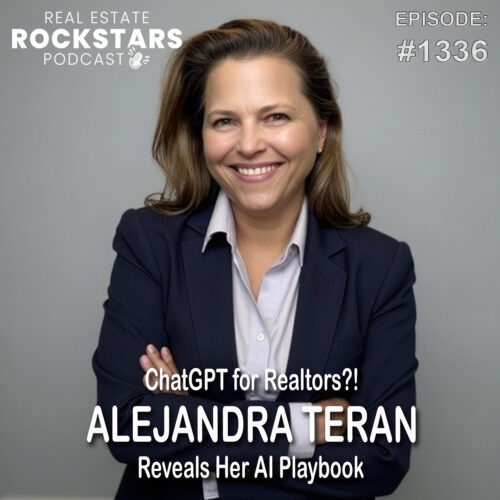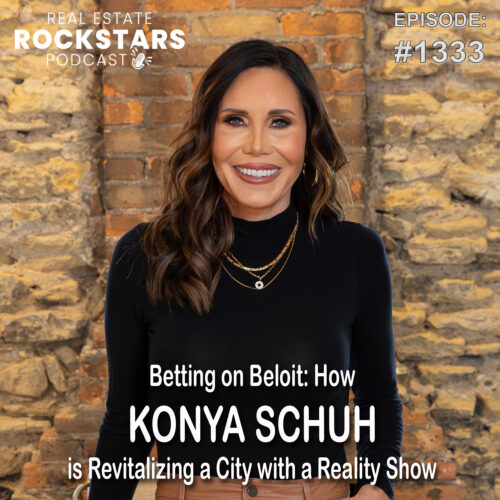 Listen to today’s show and learn:
Listen to today’s show and learn:
- Tracy’s record-breaking sales in 2019 [1:40]
- How Tracy found fast success in real estate [7:10]
- How to stand out from other Realtors [9:21]
- Why Tracy talks some clients out of selling their homes [12:20]
- Advice on branding your real estate business [14:31]
- Tracy’s suggestions on running your real estate business during a crisis [16:57]
- The mistakes that cost home sellers the most [22:59]
- Parting words for real estate agents [31:23]
- How to break through your goals.
- Plus so much more.
- Grow Your Real Estate Profits with Our Agent Success Toolbox
- Get 6 Steps to 7 Figures by Pat Hiban for FREE
- Get Tribe of Millionaires by Pat Hiban and David Osborn for FREE
- Real Estate Rescue by Tracy McLaughlin
- tracymclaughlin.com
- Tracy’s Facebook
- Tracy’s LinkedIn
- Tracy’s Instagram
- Tracy’s Twitter
- Tracy’s YouTube
Aaron Amuchastegui: Rockstar Nation, this is Aaron Amuchastegui. Today I
get to interview Tracy McLaughlin. Tracy,
how’s it going? Where are you at today?
Tracy: It’s great. I’m out here on the water in Belvedere, California, which
is just over the Golden Gate Bridge. I’m really lucky if I have to be
self-quarantining, this is a great place to do it. On the water in a town
called Belvedere.
Aaron: That is super, super awesome. Tracy, you run a big team out there in
the Bay Area, right? When I was looking at some of your bio and everything
else, you’ve got a lot of sales going on, you’ve got a book coming out. What were your sales in the last year that
you did out there?
Tracy: Last year I did 178 million. I’m super proud of that because it broke
my own record. I’ve been the number one agent every single year in Marin County
since 2005. We’ve done a lot of research around that and that is a singular
record for a county in the country. We’ve tried to find anybody else who’s done
that, we can’t so far with our research. Last year started a little bit
challenging and I thought, “Oh, I’ll never do–“
I usually do about 150 million every year, and we
ended up just knocking it out of the park in the last of all months, December
of 2019. I don’t know why there was just big sales out in the last month of
last year, so we ended up breaking my own record. I have two licensed
assistants that help me. I don’t actually have any other team members, so
that’s all my sales actually
Aaron: That is awesome. $170 million sales. What’s the average price point of those? Those are some high-end
houses.
Tracy: If you average it all out, last year, it was probably around $3, $3.5
million somewhere in that. There’s a lot of disparity in swinging pricing here.
A very expensive home in Marin County is around $15 million and there’s a
handful of those sales every five years. It’s not like Los Angeles or New York,
or those are coming on truckloads. Most trades here are $3 million, $4 million,
$2.5 million. We do, I think, about 28 to 32 transactions a year split evenly
on the buy and sell side, so it’s a pretty balanced business.
Aaron: Did you do any of those huge ones last
year, the $10 or $15 million ones?
Tracy: I did. I did a $14 million sale right as we slid into December of last
year and a couple in the 12 range. So funny, Marin is one of the most beautiful
places on the planet. If you’ve been to Belvedere or you look at Corinthian
Island, it’s very Portofino as you’ve got cliffs with boats and yachts below
the cliffs and gorgeous homes built into the hillside, and you’re looking at
the Golden Gate Bridge.
Yet, we’ve never really broken the ceiling evaluation
of a place like Santa Barbara. When Oprah Winfrey went there and knocked on the
ceiling and said, “I’ll pay 38 million for a home.” Then everybody
followed that. It’s interesting we haven’t done that yet here and it’s one of
the most beautiful places in the country. It will be interesting to see and
watch what happens after this COVID health scare if more people don’t pop right
over the bridge and have a little bit of a different experience.
Aaron: That’s just north of the Golden Gate Bridge. You have San Francisco,
you cross to Golden Gate and you’re up in Marin right there. Right?
Tracy: Exactly. I’m sure maybe you or some of your viewers have been to
Sausalito. That’s a very known touristy area. Sausalito, Tiburon, Belvedere,
Ross, it’s a great lifestyle and then you’ve got immediate access to the city,
but just as gorgeous for topography and a beach and microclimates. It’s a great
place.
Aaron: That’s interesting. I live in Northern California half the time,
Austin, Texas, half the time. Two totally different markets although those two
Austin particular is getting closer. As soon as you get 30 miles outside
Austin, you go from $700,000 price points to $100,000 price points. What’s
funny is you’re like an outskirt of San Francisco, but they’re still at $10,
$15 million price points out there as you’re getting just a little away outside
the Bay.
Tracy: That’s right. We’ve always been below Silicon Valley, which is
interesting because if you know much about Silicon Valley in a Woodside, Los
Altos, Atherton, it’s beautiful, but it’s another leafy suburb USA. It is
gorgeous, but if you were walking around the streets, you’d say, “I could
be outside of Chicago. It’s treeline pretty.” I think the interesting
thing about Marin County is that there’s nothing else like it.
You don’t have these Portofino S cliffs with yachts
and looking at San Francisco and the Golden Gate Bridge. We’re very defined by
our topography, microclimates, the beach. We’re three and a half hours from
Tahoe and 45 minutes from the Wine Country. It’s a great launching pad too for
a lot of interesting activities. That’s why white people are pulled here.
Aaron: Those high real estate prices aren’t
everywhere. Have you always done real estate near there?
Tracy: Yes. I’ve always been in Marin County. My former partner or husband and
I founded Morgan Lane in Marin, a boutique brokerage back in 2006. We grew that
very successfully, picked up all the top agents here in Marin. Then we were
able very luckily to buy Pacific Union, which became the fifth-largest
brokerage in the State. That was sold to Compass about a year and a half ago. A
long-standing history of not only being one of the top agents but then owning a
brokerage that became very well known throughout the state because we
accumulated a lot of other brokerages down in Los Angeles.
Aaron: Wow. As we’re recording this, we’re deep into second week of
shelter-in-place stuff. Real estate market is completely changing. We’ll get
into that in a second because you starting your office in 2006, that means you
have seen a couple of these ups and downs swings and shifts. Let’s talk about
that first year that you opened your office.
What were the things you did
to grow your business and to come into a market like that where at the time
average price was probably still a couple of million bucks? How did you break
into that market? How did you make a successful business your first year out?
Tracy: As an agent, you mean before brokerages?
Aaron: Yes.
Tracy: I speak a lot on this subject. There’s so many real estate agents that
are licensed with two million in the country or something. Every market has got
a surge of agents that jump to a ton of business. People, I think, start out in
the business, they’re paralyzed like, “How would I ever differentiate myself
from my colleagues?” What I did was I had been flipping homes on the side.
I had a broadcasting background. I was coming out of that saying, “What
now am I going to do?” I started buying homes and renovating them and I
had these people working for me very regularly.
When I got into the business, what I did was I decided
to become an expert in that part of the business, transforming houses and
showing people how to monetize them. It’s almost like a sixth sense for me. I
don’t know. I could just walk into a space and immediately know that all has to
come down, those counters need to be changed, that white is got too much blue
in it and it needs to be a different white. I could just see that stuff. What I
did was I started the McLaughlin Concierge Service. Everything is branding. I
created a phone number for the concierge service and I said, “24/7
concierge on board. Whether you want to list a home with me or not, call me for
advice.”
I created an iconic column and I wrapped the words
drywall painter flooring around, I wrapped those words around the column and
people used to call the number all the time. They’re like, “McLaughlin
Concierge Service.” I was like, “Yes, this is Tracy.” Then I
would help people. A lot of times, it was pro bono. It was my advice, but it
really allowed me to get a foothold in the business, which was very much
predicated on, A, being very knowledgeable about something, and B, really being
able to direct my assistance in not always a self-serving way. That grew, that
knowledge base was very, very helpful to me.
I always say to people, whatever aspect of real estate
that you fall in love with, whether it’s flipping to sell, or understanding how
to monetize a home in pre-listing renovations, or it’s understanding really
like you’re the best negotiator in the world and you’re sick of law and you
decide you want to apply it in a different sphere, figure out what it is that
you love about the business, and then take that and drill it very consistently
in a marketing and ad campaign. That will really, really help you.
Aaron: That is really great advice. I think having that concierge service, it
probably makes that phone call too for somebody so much easier. Whether you
want to hire me or not, call me for advice, and so people are now instead of
calling a real estate ad, they’re calling Tracy and it’s very low pressure.
They’re like, “Hey, we’re thinking about this and this and maybe you’ve
got the drywall for them.” Sometimes too that leads to business later. You
might help somebody to hire a handyman today and then later they’re like,
“I’m going to call Tracy when I want to sell my house.”
Tracy: It’s very true. I’ve realized that this stuff always comes around. I
got a call a few months ago from a couple, Oh my God, this was like 16 years
ago. I was like, “Oh, which house?” I was on the buy side
representing the buyer. They were the sellers. She called and she said,
“We’ve never forgotten what a great job you did for your buyers and how
well you treated us in the negotiations as the sellers. We want you on our team
on the other side.” You don’t realize how you walk through every day, what
you say, how you guide people, how much assistance you give, when you think
there’s never going to be anything that comes out of it, you don’t realize down
the road how much that stuff pays off.
I’ve seen agents in our business, are very short-term,
very shortsighted in terms of how they behave. I’ve seen agents lose listing.
Instead of saying, “Of course, I’ll release the exclusions after a
reasonable amount of time,” or of course who hold on to things. All you
have to do is have that seller tell 20 people how poorly you behaved to undo
two years of great work. People need to remember that everything is for the
longterm. It’s not a short-term investment in our business.
Aaron: That’s great advice too. You said being able to brand it, branding that
concierge service or anything else that somebody loves about the business, have
that be their niche, that thing that they get to reach out and then remembering
the goodwill that you’re doing now, especially right now as I believe we’re
heading into a slower real estate time. I believe there’s going to be a lot of
unknown stuff because of the market, because of the Coronavirus, because of
people are on unemployment and then back.
There’s probably going to be a lot more people that
need some miscellaneous help right now without the pressure of, “I don’t
know if I want to sell yet.” The colder sells, I think there’s probably a
lot of opportunity like that.
Tracy: Yes. I had a close friend call me about selling his homes, it’s a $6
million house, today, actually. He’s got a lot of commercial investment and
those tenants may not be paying the rent for a while. He’s concerned because
his discretionary money is tied up in a large commercial real estate and
especially his tenants, a lot of them are retail-oriented. He said, “Look,
I think I should pull the liquidity out of this house.”
I said, “Hold on. I know you really well. I know
how much you love that house, how much you love having dinners there with your
kids. You’re constantly the epicenter of your family coming over. You need to
think long and hard if you want to pull the trigger on something you love for a
short-term concern.” Basically, I spent the conversation talking him out
of selling the house. That’s because he has been loyal to me. He’s probably
done close to $80 or %90 million in deals with me. He’s a serial property
trader. I’m way better holding on to that relationship than give him advice
about selling a home when I don’t think that’s probably the best thing for him
to do right now.
Aaron: One of our pre-questions we ask, if you were going to do a Ted Talk,
what would it be? I think your answer was brand it like Apple. I think that’s
what you said early on is taking that brand. Any additional advice that you
would add to that, or is that exactly what
you meant by it when it came to branding?
Tracy: Let me explain that. There are certain brands that we pay more for
because we liked their packaging like Apple phones, iPhone, Apple computers,
the Four Seasons. Let’s just pretend we’re going to travel somewhere. We don’t
know the area very well, but we see that logo and we say to ourselves
internally, “Snap, that’s going to be a great experience in a hotel. I
don’t even really need to google it, yelp it, find out what people
thought.” Branding, in my opinion, it’s everything in business. It’s
everything.
What I have seen people do is not only not choose a
brand, that’s the number one thing is how you brand yourself, but then what
they do is they’re shortsighted because they pop in and out of different markets
with different messages. Instead of saying, “Oh, there’s actually an area
geographically in my community that’s not really tapped out right now. I am
going to become the expert in that part of the community. I’m going to send out
a postcard. I don’t even care if I don’t have a listing, I’m going to make
myself the expert here. I’m going to mail a postcard out every month. I’m going
to have a social media following. I’m going to do videos from the street
corners,” whatever you have to do.
What happens is I’ve seen a lot of my colleagues jump
in, give it three months, and then they just bail out because they didn’t get a
call for a listing and they go to the next thing. That chasing markets around
and chasing different buyers and sellers around without a defined brand I think
is really detrimental to your business. I always speak to not only get the
brand established for who you are and what expert you are and why people would
call you, but don’t let go of that. Keep pummeling it through postcards, social
media videos. Own the brand and don’t let go of it. Don’t give up on it just if
you’re not getting an immediate return on those efforts.
Aaron: I liked that idea out there. Let’s switch gears a little bit. Right
now, everybody’s working from home sheltering in place, especially in Northern
California Bay area where you’re at, was probably one of the first places where
everything shut down. What do you think
agents should be doing right now? What are you doing right now as far as client
outreach or anything? Any advice at all for agents that are like, “What do
we do when we’re at home and our business has slowed way down?” What can
they do right now?
Tracy: It’s a great question. This is day 16 for us on this shelter-at-home
situation. I don’t know what’s going on where you live in Austin and in
Northern California. This is funny, people have started howling at seven
o’clock out their doors and windows. Have you heard about this? Maybe this is a
Marin County thing, but last night I’d heard this was happening. People, I
think they’re going stir crazy. They’re opening the doors and howling at seven.
It’s quite funny. Anyway, after you’re done howling and when you want to get
back to work, here’s what I’m suggesting. I have worked more hours than the
last three weeks in this house with very little transactional stuff going on
that I have.
I usually work 12 hours a day anyway. I’m not doing
anything but going to yoga here and then going back to that desk. Here’s the
thing, there’s a real opportunity right now to grow your business, to contact
your clients, to have longer conversations than you would ever have with them
if this wasn’t going on. There was one client that called me who actually is
good friends with Bill Gates. He knows all those guys. We were on the phone talking
about the economy, where do we think this is going? The implications. I had the
most meaningful hour and half conversation with him.
If this had been a regular week in my business, I just
couldn’t have spent that time talking to him. The investment in relationships,
the exchange of intellect, the going through every single name on your buyer
and seller board and any potential clients and reaching out to them with a
positive spin on what’s going on. I’m not talking about mitigating how serious
this is. We could all freeze right now and say that we can’t transact homes, we
can’t show them, we can’t do this. That’s what’s going on here where I live. We
are finding very creative ways to still try to get people to put pen to paper.
I have two deals I have executed in the last week,
they’re both on homes that have been seen before the shelter-in-place. I was
lucky enough that they’d been engaged already. I got on the phone and I was
like, “You know what? This is an opportunity. Those sellers either have to
sit dead in the water for another 30 days, then they’re going to put their
homes back on as active.” Right now, they’re all temporarily withdrawn,
then we have to see if there is a reset in the market. We might have an
implosion of people coming over from San Francisco saying, “I have been in
a vertical house with stairs and elevators and not being able to get out easily
for two months now, I am moving to Marin County.”
I said, “Or you could have a lot of competition
for a great asset. Why not buy the house right now? It’s not going to go down
by 10%, we have limited supply here, there’s still a lot of continued
demand.” I understand this is a regional conversation so not everybody
might be feeling this way. At the end of the day, I feel our business is almost
protected from what’s going on because people’s homes will never matter to them
more than they do right now. How many hours a day are you looking at these
walls? If you can afford to be in something nicer, why would you not understand
the value of that after what we’re going through?
I think those kinds of conversations of encouragement
and I just put out a huge newsletter yesterday saying if you found a house or
you find a house in a location that you love and is not easily replicable, buy
it.” Don’t look back and sit there and go, “I was waiting for the
bottom, I thought I could steal it.” Good assets like great homes and
great locations, they’re always a good investment even when you go through
these little blips that we’re going through.
Aaron: That’s great advice. When they’re out there looking for properties
right now, the unique stuff is still special, the special stuff is still
special. A lot of people aren’t like your client that’s going to buy 30 houses,
they’re trying to buy one to be in for a long time. Whether they get it now or
later, you’re right, I think people’s homes mean a lot to them right now. We
just moved into a new home in Austin. Right before we got the shelter in place,
my family was so grateful, were like, “Man, we’re so grateful it’s
happening here.” I think you’re right.
Great advice too that Tracy just gave all our
listeners out there is call and reach out to the people now, and have the
conversations that you never had time to have before. You could really actually
call and ask, “Hey, how’s it going in the house? What are you thinking
about?” If somebody was interested in trying to have you help them buy a
house last month, like, “Hey, has
anything changed with that? Now that you’ve been in your house for a while, are
your goals changing? Do you want a different sized house? More bedrooms?” About
anything.
You’re right, there is going to be a lot of things
that over the last couple of weeks, where buyers may have changed their
preferences and ideas, and having those conversations now while you have time
and just being able to filter some of those questions that people have like
what’s going to happen next?
Tracy: At the end of the day, we’re transacting an asset that people enjoy,
they make their memories in homes, and people need shelter, they need places to
live. I do not think because of what’s happened, we are freezing our business,
I understand if you own a small restaurant, and your revenue is down by 70% and
your operating costs are the same, that’s really a difficult position to be in,
so I’m very empathetic to all the service providers and restaurants and things
that are going through this. I feel that we have preservation of the importance
of houses and we’ll come out of this hopefully on the other end.
Aaron: Right now, you’re at home, you’re building your business, you’re
reaching out to customers, you’re making sure you give them attention and care
with the hope that when everybody comes out of this thing, it’ll be back to
business as usual and take the unique opportunities while they can. Tell me
about your book. You’ve got a book that is releasing in just a few weeks, or
maybe it’s mid-May. Tell us about your book, why did you write your book and when is it getting released?
Tracy: If it’s okay, I’ll flush it out there because I would love everybody to
order this book called Real Estate Rescue. You can pre-order it on
Amazon in an audio format or the book itself. I’m so proud of this book for the
following reasons. It’s not how to buy, how to sell. It is insightful advice
from somebody who’s one of the top people in the country, I’ve been
consistently ranked as one of the top people in the United States. It is
everything I have seen people do wrong or right over the course of those 22
years to leave money on the table.
The idea for the book, I’ll be really quick on my
story, but a divorced couple, divorce thing, he was very generous, he gave the
soon to be ex-wife a house which was worth about $5.2, $5.3 million. She hired
a socialite friend of hers who was doubling in real estate. Literally just hung
her shingle and thought would be fun. She felt she owed that friend a favor
because the friend had been listening to her divorce woes for a year. Hires
her. The first offer as a buyer’s agent I brought to that house was for $5
million and it went unresponded to. The second offer was eight months later,
two staging changes and eight more or nine more months of carrying on a
mortgage for $4.6 million, maybe it was 5.1.
Anyway, I write the book and this is what spawned the
idea for the book, was I hope that friendship was worth $500,000 to her because
that’s what it cost her to be that woman’s friend. She’ll never know what she
left on the table because people who do not do this for a living, who think
anybody can do this or help you sell or this, that, have no idea what they’re
leaving behind because they don’t know enough to know enough. Watching that
horrible thing happen to that woman and knowing she had no idea of what she
left on the table, she just thought, “Oh, I guess I should’ve accepted
that first offer, but I didn’t. Here I am with $500,000 less to move on the
rest of my life with.”
I thought it was a tragedy, I see this happen all day
every day in our business. The nucleus of the issue, the reason this happens is
we are, as an industry, not as educated as most people who are money managers.
If you’ve got your stock portfolio with somebody, they went to college for four
years, they’ve got a Series 7, they’ve got a serious restriction on what they
can and can’t do.
We need 60 hours of Anthony’s real estate school, we
can be 18 years old and telling people what to do with their homes and
oftentimes, very incorrectly. I wrote this book as a result of all these ideas.
The book is very self-deprecating, it has funny illustrations. It’s a really
funny book also but it’s hit number one in a couple of categories already and
the content, nothing’s ever been written like it and that’s why I decided to
write the book. It was published by Mango, it’s not self-published, it’s a
great book.
Aaron: That’s awesome. Is it aimed at
real estate agents or people thinking about selling their house?
Tracy: Everybody. I think a great segment of the book sales will go to people
in my industry who want to learn from one of the best and they just take
copious notes on all these chapters about mistakes that are made. I’ll give you
one quick point. Out here, I’m a huge fan of leaving absolutely nothing to
compromise the sale of the asset. A lot of times, and I see this all the time,
you’ve got agents just rolling houses on the market without pre-listing
inspections. The worst thing that can happen in our market is for an escrow to
be canceled. You will never go back and recover that first 10 to 12 days of
marketing and multiple offers which we’re used to out here.
Once you’ve got a canceled escrow, that’s it,
you’ll never recover the momentum and the pricing you would’ve gotten if you
hadn’t fallen out of a contract. The reason why a lot of these homes fall out
of contract is somebody discovers something that was easily discoverable by the
seller. One of the things I will not take a listing unless my sellers do seven
pre-listing inspections, out here that’s everything from roof, chimneys,
structural drainage, home pests, mandatory sewer lateral. Those are the
inspections buyers are getting here.
Anyway, I’m just leaving very little margin for error
in my listings so that when I put this on and we price them right, they trade
out immediately.
There’s no more negotiation, it’s a done deal and
everybody goes to bed after the offer is right applied and says, “That’s
it, my house is closing.” This book addresses all sorts of things like the
tactical things like pre-listing inspections and a lot of case study on the
emotional component of why people hold on to their homes and they don’t listen
to their agents. If agents are listening to this and want to understand how to
really get to their sellers in terms of moving them off what they think their
home’s worth and getting it priced right so you can actually sell the thing and
earn a living, that’s very much addressed in this book.
Aaron: Wow. Being able to help deal with clients’ emotions with that, being
able to take those opportunities to increase the valuation. When you get those pre-inspections done, do
you just attach them to the listing? Do you send them out as soon as–?
Tracy: Yes. We call them buyer’s packet here. Basically, we drop the seller
disclosures and all those pre-listing inspections together in one big buyer’s
packet, and we have potential buyers sign off an entire packet before they make
an offer. That’s just done. It costs the seller somewhere around $3,000 for all
those reports here. It’s the best $3,000 they could ever spend because I’m
trying that whole nail-biting thing of, we finally got an offer, we’re finally
in contract. Now we’re going to spend 14 to 17 days sweating at night, biting
our nails. Will they? Won’t they? Are they? This is just a clean way to sell
houses.
Aaron: You show them the house, they’ve got the packet.
Tracy: [crosstalk] every market. What’s that?
Aaron: You show them the house, they’ve got the packet. They’re not
negotiating credits or repairs midway in or changing their mind. They know
everything ahead.
Tracy: Exactly, and they sign off on that. My business model is to not have
provisions. They can certainly bring in whoever on their own team experts to
verify their reports, but we get our reports done by the very best inspectors.
We encourage them, bring your own contractor, bring on people but do that before
you write the offer and satisfy yourself to the state of this house instead of
holding us as the seller upset.
Aaron: Yes, make sure it’s ready.
Tracy: There’s a lot of stuff like that in there. I just got a shopping
agreement for a TV show on the book and the nucleus of that show when he gets
developed will be about the wrangling that goes on between us as agents and our
sellers. Think about this, in any other business endeavor. Let’s say you go to
the hospital and you go, “God, my shoulder has been hurting,” blah,
blah. The doctor says, “Here’s the protocol. We’re going to do a surgical
repair.” You would just, “Thank you. I can’t wait to get back here. I
want to go.” Our business is the excellent opposite. You are the expert.
You walk in and the seller listens to you and says,
“I absolutely disagree with everything you’re saying, we don’t need to
change the paint.” That slab, I loved that granite slab from 1985, it’s
worthwhile. My friends come over here,” and tell me how much they love our
granite slabs. They love our granite slabs. There you are pleading with people
for them to make more money on their home. The incongruent in that is just
beyond. This book really addresses how to work through that. How language to
tell people that you’re on their side, this is not about making commissions.
This is about making them more money on the sale of their home.
Aaron: How Funny. That is exactly right. You go talk to your doctor, the
doctor says, “Hey, we looked at the X-ray and this is what we found.”
Everyone’s like, “Okay.” You’re an agent and you go in and say,
“Hey, we’ve looked at the X-ray and this what we found and they’re like,
“No, you’re wrong.” You’re really just trying to help them maximize
that. That’s quite a battle. That sounds like it would be a fun TV show. Sounds
like a great book. Real Estate Rescue, Tracy McGlaughlin. Tracy, any final recommendations right now for
people out there in the world? How can we find you?
Tracy: Final recommendations would be what a great career we all have an
opportunity to succeed at with a lot of really long hours. It said that you
don’t become successful not doing this for many, many hours every day. I’d say
I think something that’s very optimistic to think about I write about in the
book is people need us. I’m sorry. There is no way you can take people with the
emotive component of buying something they fall in love with and selling
something that they’re in love with emotionally and put those people together
and think that’s going to be transacted with algorithms or machines. It’s just
not.
We are one of the very necessary industries in this
country that get that ebb and flow to work so that people can move on and move
to the next house. I think we have a real opportunity to preserve our industry
if it’s done with integrity and a lot of the principles actually in this book,
I don’t think we’re going away is what I would conclude with.
Aaron: Awesome. Tracy, social media, websites, anything like that for us to find you?
Tracy: Yes. tracy@tracymcglaughlin.com. If anybody wants to email me and ask a
question, you can always welcome to reach out. If anybody is listening to this
and says, “I just want her help,” I’d be happy to talk to you on the
phone. I’m on Facebook. I’m on LinkedIn. What else do you want to? I’m on Instagram.
Aaron: That’s the way to find you. That’s all the stuff. Sounds like all the
different social media out there, but take Tracy up on that offer. Like so many
of our agents out there, so many of our listeners are new agents. I tell
people, other agents, investors, everything right now, when I say reach out to
me for advice, I am telling the truth. I want to help people. Tracy wants to
help people, I can tell as I’ve been talking to her today. This has been an
awesome show. Tracy, thanks for getting on here. I hope you go enjoy the rest
of your day.
Tracy: Thank you so much. Nice to meet you. Thank you.
Aaron: Thank you.





